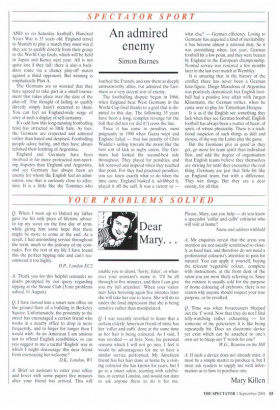An admired enemy
Simon Barnes
AND so on Saturday football's Hundred Years War is 35 years old. England travel to Munich to play a match they must win if they are to qualify directly from their group to the World Cup finals, which will be held in Japan and Korea next year. All is not quite lost if they fail: there is also a backdoor route via a chancy play-off match against a third opponent. But winning is emphatically Plan A.
The Germans are so worried that they have agreed to take part in a small tournament that takes place over the date of the play-off. The thought of failing to qualify directly simply hasn't occurred to them. You can feel an England-wide surge of envy at such a display of self-certainty.
It's odd how this long-running footballing feud has attracted so little hate. As foes. the Germans are respected and admired rather than hated and despised. Footballing people adore hating, and they have always relished their loathing of Argentina.
England and Germany have been involved in far more protracted non-sporting disputes than England and Argentina, and yet Germany has always been an enemy for whom the English feel an admiration, one that is curiously close to affection. It is a little like the Tommies who loathed the French, and saw them as deeply untrustworthy allies, but admired the Germans as a very decent sort of enemy.
The footballing dispute began in 1966, when England beat West Germany in the World Cup final thanks to a goal that is disputed to this day. The following 35 years have been a long, complex revenge for the ball that did not (or did it?) cross the line.
Twice it has come to penalties, most poignantly in 1990 when Gazza wept and England failed — that last penalty of Chris Waddle's sailing towards the moon like the best sort of kick in rugby union. The Germans had looked the second-best side throughout. They played for penalties, and felt renewed and inspired when they reached that point. For they had practised penalties, you see, knew exactly what to do when the time came. England busked it, ad-libbed it, played it off the cuff. It was a victory to — what else? — German efficiency. Losing to Germany has acquired a kind of inevitability: it has become almost a national duty. So it was astonishing when, last year, German football hit a low point, and they were beaten by England in the European championship. Normal service was restored a few months later in the last ever match at Wembley.
It is amazing that in the history of the conflict there has never been a German hate-figure. Diego Maradona of Argentina was positively demonised; but English football had a positive love affair with Jurgen Klinsmann, the German striker, when he came over to play for Tottenham Hotspur.
It is as if the English see something they lack when they see German football. English football has always been a matter of heart, of spirit, of robust physicality. There is a traditional suspicion of such things as skill and slyness, of the way the Latins play the game.
But the Germans give as good as they get, go more for team spirit than individual flair, and add the degree of organisation that English teams believe they themselves are striving for until they encounter the real thing. Germany are just that little bit like an England team, but with a difference. They win things. But they are a dear enemy, for all that.


























































 Previous page
Previous page